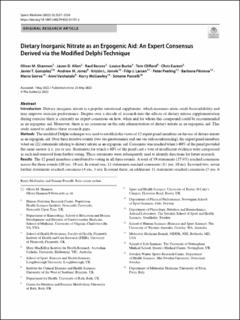| dc.contributor.author | Shannon, Oliver M. | |
| dc.contributor.author | Allen, Jason D. | |
| dc.contributor.author | Bescos, Raul | |
| dc.contributor.author | Burke, Louise | |
| dc.contributor.author | Clifford, Tom | |
| dc.contributor.author | Easton, Chris | |
| dc.contributor.author | Gonzalez, Javier T. | |
| dc.contributor.author | Jones, Andrew M. | |
| dc.contributor.author | Jonvik, Kristin Lundanes | |
| dc.contributor.author | Larsen, Filip J. | |
| dc.contributor.author | Peeling, Peter | |
| dc.contributor.author | Piknova, Barbora | |
| dc.contributor.author | Siervo, Mario | |
| dc.contributor.author | Vanhatalo, Anni | |
| dc.contributor.author | McGawley, Kerry | |
| dc.contributor.author | Porcelli, Simone | |
| dc.date.accessioned | 2022-11-29T16:32:34Z | |
| dc.date.available | 2022-11-29T16:32:34Z | |
| dc.date.created | 2022-08-30T12:33:30Z | |
| dc.date.issued | 2022 | |
| dc.identifier.citation | Sports Medicine. 2022, 52(10), Side 2537-2558. | en_US |
| dc.identifier.issn | 0112-1642 | |
| dc.identifier.uri | https://hdl.handle.net/11250/3034835 | |
| dc.description | This article is licensed under a Creative Commons Attribution 4.0 International License, which permits use, sharing, adaptation, distribution and reproduction in any medium or format, as long as you give appropriate credit to the original author(s) and the source, provide a link to the Creative Commons licence, and indicate if changes were made. The images or other third party material in this article are included in the article's Creative Commons licence, unless indicated otherwise in a credit line to the material. If material is not included in the article's Creative Commons licence and your intended use is not permitted by statutory regulation or exceeds the permitted use, you will need to obtain permission directly from the copyright holder. | en_US |
| dc.description.abstract | Introduction: Dietary inorganic nitrate is a popular nutritional supplement, which increases nitric oxide bioavailability and may improve exercise performance. Despite over a decade of research into the effects of dietary nitrate supplementation during exercise there is currently no expert consensus on how, when and for whom this compound could be recommended as an ergogenic aid. Moreover, there is no consensus on the safe administration of dietary nitrate as an ergogenic aid. This study aimed to address these research gaps.
Methods: The modified Delphi technique was used to establish the views of 12 expert panel members on the use of dietary nitrate as an ergogenic aid. Over three iterative rounds (two via questionnaire and one via videoconferencing), the expert panel members voted on 222 statements relating to dietary nitrate as an ergogenic aid. Consensus was reached when > 80% of the panel provided the same answer (i.e. yes or no). Statements for which > 80% of the panel cast a vote of insufficient evidence were categorised as such and removed from further voting. These statements were subsequently used to identify directions for future research.
Results: The 12 panel members contributed to voting in all three rounds. A total of 39 statements (17.6%) reached consensus across the three rounds (20 yes, 19 no). In round one, 21 statements reached consensus (11 yes, 10 no). In round two, seven further statements reached consensus (4 yes, 3 no). In round three, an additional 11 statements reached consensus (5 yes, 6 no). The panel agreed that there was insufficient evidence for 134 (60.4%) of the statements, and were unable to agree on the outcome of the remaining statements.
Conclusions: This study provides information on the current expert consensus on dietary nitrate, which may be of value to athletes, coaches, practitioners and researchers. The effects of dietary nitrate appear to be diminished in individuals with a higher aerobic fitness (peak oxygen consumption [V̇O2peak] > 60 ml/kg/min), and therefore, aerobic fitness should be taken into account when considering use of dietary nitrate as an ergogenic aid. It is recommended that athletes looking to benefit from dietary nitrate supplementation should consume 8–16 mmol nitrate acutely or 4–16 mmol/day nitrate chronically (with the final dose ingested 2–4 h pre-exercise) to maximise ergogenic effects, taking into consideration that, from a safety perspective, athletes may be best advised to increase their intake of nitrate via vegetables and vegetable juices. Acute nitrate supplementation up to ~ 16 mmol is believed to be safe, although the safety of chronic nitrate supplementation requires further investigation. The expert panel agreed that there was insufficient evidence for most of the appraised statements, highlighting the need for future research in this area. | en_US |
| dc.language.iso | eng | en_US |
| dc.subject | Delphi technique | en_US |
| dc.subject | dietary inorganic nitrate | en_US |
| dc.subject | ergogenic aid | en_US |
| dc.subject | supplementation | en_US |
| dc.title | Dietary inorganic nitrate as an ergogenic aid: An expert consensus derived via the modified Delphi technique | en_US |
| dc.type | Peer reviewed | en_US |
| dc.type | Journal article | en_US |
| dc.description.version | publishedVersion | en_US |
| dc.rights.holder | © The Author(s) 2022 | en_US |
| dc.source.pagenumber | 2537-2558 | en_US |
| dc.source.volume | 52 | en_US |
| dc.source.journal | Sports Medicine | en_US |
| dc.source.issue | 10 | en_US |
| dc.identifier.doi | 10.1007/s40279-022-01701-3 | |
| dc.identifier.cristin | 2047166 | |
| dc.description.localcode | Institutt for fysisk prestasjonsevne / Department of Physical Performance | en_US |
| cristin.ispublished | true | |
| cristin.fulltext | original | |
| cristin.qualitycode | 2 | |
